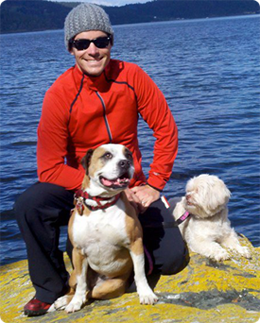
I began working with dogs in 2003 in Los Angeles, CA, while fostering rescue dogs prior to adoption. Eventually, my wife and I adopted an emaciated, yet vigorous Boxer mix named Vida. She was described by the rescue organization as a "dog that did not get along well with other dogs of the same sex." This gave us cause for concern, but after a few days and nights with Vida, we fell in love and accepted the challenge, though we had no idea what we were in for. After all, we were rookies.
Vida has been my primary inspiration and the fire behind my passion for all things dog. Working with her has been a daily reminder that behavior is in constant flux. She has taught me patience and continues to help me deal with my frustrations. She is a lovely friend, but not a perfect one. She is who she is, and I accept that now. On a daily basis, we train together, and each day she gets more comfortable with the things that once made her behave aggressively.
We have since adopted Lily, a lovely little Lhasa Apso, and, on occasion (when we need a dose of madness), we foster puppies if they fit well in our environment.
Our methods are primarily reward-based. We believe food reward training is the easiest, quickest, and most family-friendly way to train companion dogs. We typically avoid aversives (things your dog finds threatening/offensive) in our efforts, but recommend training collars, on occasion. We spend the majority of our efforts on teaching dogs what to do or what we want by reinforcing behaviors we want to see more of.
We accomplish our goals, primarily, through lure-reward training and clicker training / shaping. We will not tell you to "put the dog in her place," "show the dog who's boss," or focus on status and pack order. Behavior that is reinforced (commonly referred to as "rewarded") occurs more often, thus we emphasize reward training. Common reinforcements are: food, play, toys, affection, access to other dogs, and walks, but can be anything your dog loves. Dog training is for you and your dog, and we avoid damaging our relationship with our pet by being nasty.
Sounds good, doesn't it?